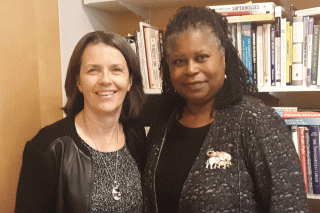In Spring 2019, School of Business Professor Stacy Blake-Beard and Professor of Practice Mary Shapiro presented their joint research project, “Getting Close...But Not Too Close: Mentoring in the #MeToo Era,” for the Center for Gender in Organizations (CGO). The project included collaboration with faculty and graduate students from the College of Natural, Behavioral, and Health Sciences and addressed the importance of mentorship as well as scrutiny of these relationships.
Contemporary cross-gender mentoring
Blake-Beard’s research has always focused on mentoring and gender. During the 2016 Presidential campaign, an interview resurfaced with the future Vice President Mike Pence in which he stated that he does not dine alone with a woman who is not his wife. Blake-Beard points out the chill that this statement could have on cross-gender mentoring.
“This 'Pence Effect' was important to study," says Blake-Beard. "The opportunity to examine cross-gender mentoring from a different, contemporary lens was a welcome challenge.”
“We know that mentoring is a major factor in someone’s career advancement, providing social-emotional and career support,” says Shapiro. “From all the media, it appeared that men were protectively removing themselves from being mentors, which could mean that key support for women’s advancement would be withdrawn. We wanted to see if that dynamic was indeed happening; what, if anything, has changed; and, what women and their organizations are doing about it.”
Has the #MeToo movement changed mentoring?
“The function of the #MeToo movement as a way to acknowledge power differentials and to protect those who may be taken advantage of is critical,” says Blake-Beard. “These power differentials and the potential exploitative behavior is not new. The increased media attention encouraged by the #MeToo movement gives a name to these age-old dynamics and demands change. I believe that the #MeToo movement should encourage mentoring partners to pay attention to their dynamics.”
The nature of a useful mentorship is that both partners are willing to share experiences.
“There is a level of closeness that is needed to gain the benefits of mentoring," explains Blake-Beard. "So both partners need to become open and vulnerable to one another. What happens if the relationship between mentor and protégé does cross that line of getting too close?”
On the outside looking in
The second aspect is the external perception of the relationship: Do others looking at the relationship think the partners have become too close? Women have always had to manage this issue. With the Pence statement, there was a highlighting that men need to pay attention, too. Preferably not by avoiding these mentorships, entirely.
“We are continuing to examine the results we got from the survey at the 2019 leadership conference,” says Shapiro. “We are able to reveal an interesting picture of what’s happening, contrary to the hysteria in the media.”
The results will be published in a future edition of CGO Insights. Blake-Beard and Shapiro intend to write other articles focused on human resources and diversity professionals, who have the responsibility to ensure that cross-gender mentoring continues in their organization.
Learn more about the College of Organizational, Computational, and Information Sciences and the College of Natural, Behavioral, and Health Science.

